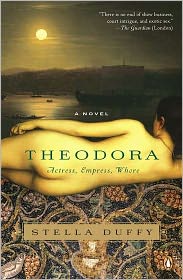
This is a fictional biography that travels the reader back in time, to the Byzantium era and the glory days of the great city of Constantinople. That is where that we for the first time meet Theodora, the second of three sisters, who due to the difficult times her family is going through, has to start working and earn a living from a very young age. She and her sisters, under the instructions of an eunuch called Menander, are getting ready for a life spent at the Hippodrome, which in today’s term we would call the show biz.
Theodora is at the time a beautiful girl with an unruly character. She likes picking up fights every now and then and making fun of people, and so very often she comes to receive heavily handed punishments from her tutor, which however cannot tame her spirit. Some of the girls have a talent for dancing and others for singing. Theodora though, who unwillingly has to follow in their footsteps has no talent whatsoever in none of the above. But she has what the others lack; she’s street and stage smart and an exceptional comedian. She can tell stories like no other, make people laugh all too easily and dazzle the crowds with her scene presence
Through, the narrow at the beginning and ever expanding as time goes by, thread of the narration we follow step by step the remarkable life journey of this woman: from childhood to premature adulthood, from play to prostitution, from ignorance to harshly earned knowledge and from despair to despair. Theodora spends most of her life dressed in the veils of a unique melancholy. And if it wasn’t for some sudden explosions of joy every now and then one would say that she’s never been happy at all; since she was always deep in thought; since she used to spend as much time as she could by herself and, since very often she’d hide in the dark corners of the great church of Hagia Sofia praying for one thing or another, or maybe just trying to get away from something. No matter how much she used to shine on the big stage, no matter how good she came to be in the lovemaking game, she hid he true self somewhere in the dark – and that was a self of a life unfulfilled, in search of a meaning.
However, sooner rather than later came the time when she found her way out of her dead end; and that was when she met Hecebolus, the governor of Pentapolis in Northern Africa, with whom she had fallen in love. At the age of eighteen, leaving behind a life of wealth and glory, she follows the man that stole her heart, to Apollonia, along with a talentless girl from her troupe. The latter would one day find her way into the bed of Hecebolus and herself pregnant, paving the way for Theodora, who was already tired of her life there, to leave. Soon enough the betrayed woman will find herself in Alexandria, where she’ll meet Timothy, the patriarch of the city and ruler of Egypt, who will take her under his protective wing before sending her off to the desert to atone for her sins. Her past though will keep hunting and haunting her, and it’s exactly this past that her guardians will try to exploit in order to succeed in their otherwise sacred plans. Theodora will be used by them in order to open the way for the enthronement of their chosen one, Justinian, in Constantinople. However, to manage that she first has to get close to him. And that she will do, with the help of some friends and co-conspirators.
When she at last returns to Polis, her city (that’s what Polis means) she is a changed woman, a different person from the one that left. The passions of the flesh have not abandoned her, but in more than one ways she’s wiser than before. It’s this wisdom, but also the endurance that she came to muster during her long absence, that she’ll bring to good use to fulfill her duty and accomplish her mission. A duty and a mission that will finally lead her exactly to a place in life that she’d always dreamed about but never hoped reaching; a place of happiness.
This is a well written story about one of the strangest eras in Christian times. An era in which in the very heart of Christianity pagan rituals were performed in daily basis, when prostitution was not at all something out of the ordinary and, finally, when, just like today, those in power or with power never stopped arguing with each other and using any means necessary to achieve their goals.
The author, using a plethora of sources, manages to bring to life those distant times, to guide the reader in a splendid narrative way into a distant past, and to show us Christians some things that we’d rather ignore or, if we know, forget. Well done.

No comments:
Post a Comment